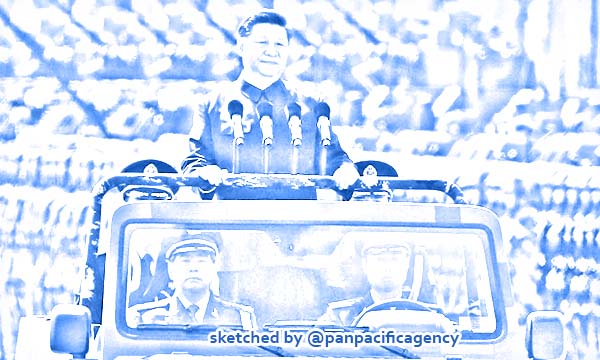Xi Jinping tells Chinese army to step up combat readiness

China’s President Xi Jinping reviews troops of the People’s Liberation Army. Photo: AFP /The Yomiuri Shimbun. Sketched by the Pan Pacific Agency.
BEIJING, May 27, 2020, SCMP. The Chinese army must step up combat readiness, Chinese President Xi Jinping has said, as the country increases defence spending to tackle “security threats from Taiwan independence forces,” South China Morning Post reported.
Xi told Chinese military officers on the sidelines of the annual meeting of the National People’s Congress (NPC), China’s top legislature, that the People’s Liberation Army (PLA) had performed well in helping to contain the Covid-19 outbreak but should explore new ways of training during the pandemic.
“It is necessary to explore ways of training and preparing for war because epidemic control efforts have been normalised,” Xi was quoted by state news agency Xinhua. “It is necessary to step up preparations for armed combat, to flexibly carry out actual combat military training, and to improve our military’s ability to perform military missions.”
Xi, who chairs the Central Military Commission, said the pandemic had created challenges for the military, but China’s integration of the civil, military and political spheres had been an advantage during the crisis.
His meeting with PLA officers came as China announced a 6.6 per cent year-on-year increase in its defence budget.
Defence ministry spokesman Wu Qian said China was facing heightened security threats, especially from Taiwan’s independence-leaning ruling party.
“The Democratic Progressive Party [DPP] authorities in Taipei are relying on external forces and going further down the path of separatism,” Wu said on the sidelines of the parliamentary gathering. “The situation against separatism is getting grimmer.”
Last week, US Secretary of State Mike Pompeo sent his congratulations to Taiwanese President Tsai Ing-wen on the start of her second term in office, along with an approval for the United States’ sale of US$180 million worth of submarine-launched torpedoes to the self-ruled island.
Wu said China faced new risks and challenges in national security, including unilateralism by “some countries” that was shaking international security and escalating geopolitical risks, as well as what he said were increasingly complex domestic security threats and secession movements.
“We have to make economic calculations but above that we have to make security calculations when we consider military spending,” Wu said when asked about this year’s defence budget.
Despite the economic decline in the first quarter of the year, Beijing last week announced 1.27 trillion yuan (US$178 billion) in defence spending, up 6.6 per cent year on year.
Beijing claims sovereignty over Taiwan and threatens to use force to reunify it with mainland China, if necessary. The two sides have halted dialogue since the DPP won the island’s general election in 2016 – it did so again in 2020 – and military tension has mounted as relations between Beijing and Washington have steadily deteriorated, while the US has increased its support to Taipei.
The US switched its diplomatic recognition from Taipei to Beijing in 1979, but maintained unofficial ties with the former, including through arms sales to the island. Tsai has vowed to bolster Taiwan’s defences, and in the past year the US has sold it US$2.2 billion worth of battle tanks and surface-to-air missiles, along with US$8 billion of F-16 fighter jets.
Wu said the US arms sales were “extremely wrong and very dangerous”, and added that any attempt by the DPP to seek independence by force would “end up in history with shame and disgrace”.
He said the military budget was still “far behind” what was needed to protect China’s sovereignty, security, development and other interests, adding that “moderate and stable growth” in spending was reasonable.
China’s official defence budgets have long been criticised as opaque, but Wu said they were always “open and transparent”.
Yoram Evron, an expert on China’s military at the University of Haifa’s department of Asian studies, said the spending reflected Beijing’s feeling of insecurity.
“China doesn’t feel safe enough – externally but maybe also internally – to slow down its military build-up, no matter what the economic circumstances are,” he said. “But at the same time it is still constrained by economic developments and it probably doesn’t want to project an aggressive image.”